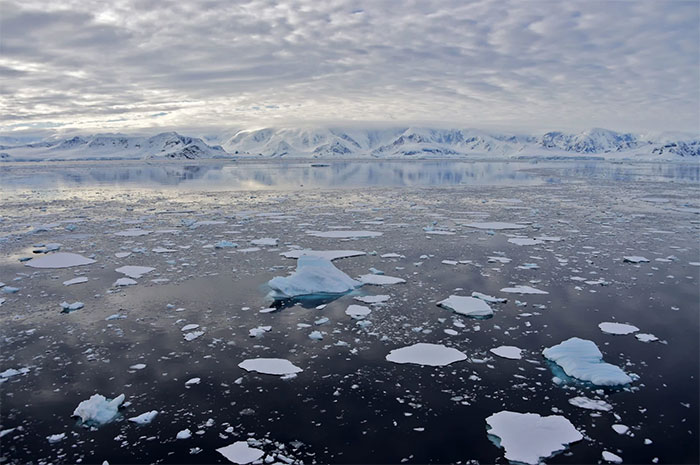Discovering the role of ocean currents in ice shelf melting
A new study published in the journal Nature Communications found that ocean currents moving in winding patterns play a large role in the melting of ice shelves in Antarctica. This phenomenon could cause sea levels to rise significantly.
In the study, scientists found that interactions between meandering ocean currents and the ocean floor lead to increased water velocities, transporting warm water to shallower depths. Warm ocean water then affects the ice sheets and causes them to melt faster. Before this study, most people believed that the main cause of ice shelf melting was winds blowing across the Southern Ocean.

Drift ice in Chiriguano Bay, South Shetland Islands, Antarctica. (Photo: AFP/TTXVN).
The study focused on two ice shelves in Antarctica called Pine Island and Thwaites . These ice shelves are changing very rapidly and are especially vulnerable to warming ocean waters.
They act like large barriers, blocking the glaciers behind them from flowing into the ocean. Therefore, if these ice shelves melt and collapse, global sea levels are at risk of rising, causing challenges for communities living near the coast.
In the above study, scientists studied a layer of warm water below the surface of cold water and called this layer " Modified Circulating Deep Water". Mr. Taewook Park, one of the members of the research team, explained that the strength and path of ocean currents around the ice shelf directly govern the amount of warm water flowing in and this affects the melting rate of the ice shelf. ice shelves.
Until now, it was thought that westerly winds in the northern Amundsen Sea pushed ocean currents along the ice shelves and brought warmer water toward the ice shelves. This is said to happen more often during the El Niño phenomenon. However, the new study above contradicts this argument.
The above study offers a new approach to the cause of Antarctic ice shelves melting, thereby emphasizing the larger role of ocean currents than previously thought. With this new information, scientists will need to reassess the impact of wind on ice loss in Antarctica, which could change predictions about the future.
The research was conducted by scientists from the Korea Polar Research Institute of Japan's Hokkaido University and Seoul National University.
- Video: Ocean flow in the world
- Unprecedented ocean currents were discovered by ... seals
- Giant ice breaks 1,000km long in the Beaufort Sea
- Finding a solution to slow the speed of ice melting is surprisingly simple!
- Seaways play an important role in climate change
- Japan tests electricity production by ocean currents
- The cause of wind, tide and sea currents
- Antarctic ice is melting from the bottom of the ice
- 'Doomsday' comes true: the ocean is paralyzed, bringing the Earth back to the Ice Age?
- The only mystery about the sea is not in the world
- North Atlantic ocean currents heat the Arctic
- See the Earth as beautiful as Van Gogh
 Is the magnetic North Pole shift dangerous to humanity?
Is the magnetic North Pole shift dangerous to humanity? Washington legalizes the recycling of human bodies into fertilizer
Washington legalizes the recycling of human bodies into fertilizer Lightning stone - the mysterious guest
Lightning stone - the mysterious guest Stunned by the mysterious sunset, strange appearance
Stunned by the mysterious sunset, strange appearance